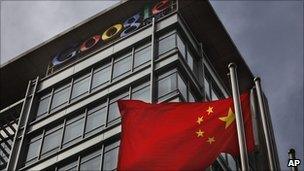China leadership 'orchestrated Google hacking'
- Published

Google left the mainland after refusing China's demand to censor its searches
Senior Chinese figures were behind the hacking of Google earlier this year which forced the search engine to quit the country, leaked US cables suggest.
One cable, released by whistle-blowing site Wikileaks, cites a "well-placed" contact as saying the action against Google was "100% political".
A politburo member is said to have been angered after Googling his name and finding critical comments online.
The cable says it is unclear whether China's top leaders were involved.
Other cables show Beijing has been "extremely concerned" about the use of high-resolution satellite imagery on Google's mapping software, Google Earth.
In January, Google said it had been subjected to a "sophisticated cyber attack originating from China" - it said the e-mail accounts of human rights activists were among those hacked.
In the ensuing row over internet censorship, Google abandoned mainland China and moved its Chinese-language operations to Hong Kong.
The company did not say who it thought was responsible but the cables, released by Wikileaks and published on the Guardian website, show the company had repeatedly raised concerns about the issue.
'Forbidden fruit'
The BBC's Nick Childs says the allegations contained in the cables will reinforce both the perception that the Chinese government is highly sensitive about the internet and suspicions that it was behind the hacking attacks on Google.
One cable from the US embassy, external in Beijing cites a "well-placed contact" as claiming "that the Chinese government coordinated the recent intrusions of Google systems".
"According to our contact, the closely held operations were directed at the Politburo Standing Committee level," it says.
The source, whose name is deleted from the text, told the US that the operations against Google were "100%" political in nature, not an attempt to reduce Google's influence in China in favour of domestic search engines, such as Baidu.
But the writer of the cable notes that it is "unclear whether President Hu Jintao and Premier Wen Jiabao were aware of these actions" before Google publicly announced its concerns.
The cable also reports on alleged concern in the Chinese government that, by challenging official censorship of the internet, Google had made itself seem more appealing to Chinese net users and given the impression that the US and Google were working together "to undermine Chinese government controls of the internet".
"All of a sudden, XXXXXXXXXXXX continued, Baidu looked like a boring state-owned enterprise while Google "seems very attractive, like the forbidden fruit," it says.
In cable dated 18 May 2009, external, US diplomats quote a Chinese source as saying that "the root of the problem" was an unnamed member of the politburo standing committee who wanted Google to stop linking to its international site from its sanitised version, google.cn.
The politician is said to have "recently discovered that Google's worldwide site is uncensored, and is capable of Chinese language searches and search results". He reportedly carried out a search for his own name and found sites personally critical of him.
Google consistently refused to remove the link, citing its own anti-censorship principles, and eventually left the Chinese mainland.
The cable says that while the US can neither confirm nor deny the allegations against Beijing, "the potential for continuing escalation by the Chinese, assuming Google sticks to its guns - and the likelihood of loud US Congressional and public outcry if it caves - suggest a high-level USG [US government] response may be in order".
The following January, US Secretary of State Hillary Clinton urged China to fully investigate the hacking allegations.
"Countries or individuals that engage in cyber attacks should face consequences and international condemnation," she said.